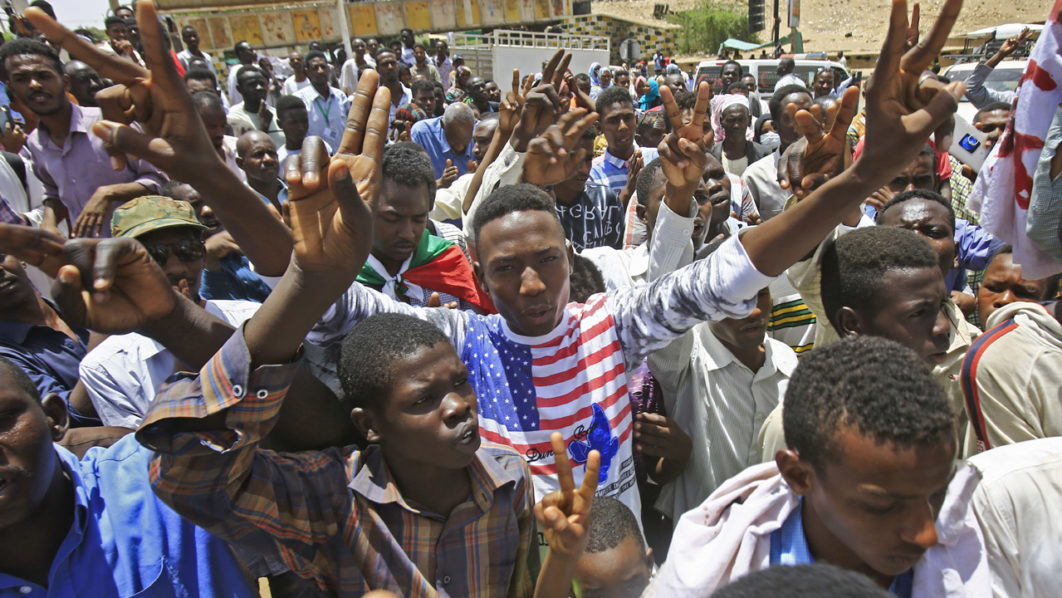 |
| Sudanese chant slogans as they gather during a demonstration outside the army headquarters in Khartoum on May 2, 2019. – Crowds of Sudanese demonstrators began converging in Khartoum for a “million-strong” march to press for a civilian administration after talks with military rulers ran into trouble. (Photo by ASHRAF SHAZLY / AFP) |
Crowds of Sudanese demonstrators began converging outside the army headquarters in Khartoum Thursday for a “million-strong” march to press for a civilian administration after talks with military rulers ran into trouble.
The two sides have agreed on forming a joint civilian-military council to rule Sudan but are at odds over its composition.
The proposed joint council is to replace the existing 10-member ruling body of army generals that took over after the military ousted veteran president Omar al-Bashir three weeks ago.
But protest leaders from the Alliance for Freedom and Change say the generals are not serious about handing power to civilians.
The army has been pushing for a 10-member council of seven military representatives and three civilians.
The alliance is demanding a council made up of eight civilians and seven generals.
The disagreement prompted the alliance to announce a “million-strong march to assert our main demand, which is for the civilian rule”.
The call has exacerbated tensions between the two sides.
“We expect the march to draw huge crowds today,” Ahmed al-Rabia, a leader from the protest movement told AFP.
Protest leaders said Thursday they were also handing the military a proposal for the new civilian structures they want to see rule the country eventually, including “a sovereign council, the executive and the legislative bodies”.
‘Asking for trouble’
As the wrangling with the army persisted, crowds of demonstrators flocked to the protest site in central Khartoum to join the thousands who have remained camped there round-the-clock for weeks.
The military council has warned it will not allow “chaos” and urged protesters to dismantle makeshift barricades they have set up around the main protest hub outside army headquarters.
It also demanded demonstrators open roads and bridges blocked by protesters who have remained outside the headquarters despite Bashir’s departure.
Witnesses said that the bulk of the crowd was expected to converge at the protest site only later in the day when the worst of the midday heat had passed.
But the protesters camped in the square kept up a festive atmosphere with loudspeakers blaring out revolutionary songs and vendors selling fruit and peanuts.
In a bid to get their differing views across the military and protester leaders held separate news conferences Tuesday.
“The military council is not serious about handing over power to civilians,” said Mohamed Naji al-Assam, a leader of the Sudanese Professionals Association (SPA) spearheading the protests.
In an interview with AFP on Wednesday, Sadiq al-Mahdi, Sudan’s former premier and political opponent of Bashir, warned protest leaders against provoking the military.
“If we provoke the… armed forces which contributed to the change, we would be asking for trouble,” said Mahdi, whose National Umma Party is part of the protest movement.
‘No chaos’
The military council’s deputy head Mohammad Hamdan Dagolo has said it is “committed to negotiations but (will allow) no chaos”.
Hamdan, widely knowns as Himeidti, spoke of incidents since the protests first broke out in December including looting and burning of markets. He said across the country six security personnel were killed during protests on Monday.
The spokesman of the military council Shamseddin al-Kabbashi said the “armed forces must remain in the sovereign council” because of tensions facing the country.
The announcement on the joint civilian-military council on Saturday was seen as a breakthrough aimed at paving the way for detailed negotiations on a roadmap for the formation of a civilian government.
But Rabia said on Thursday that no date had been set for further talks with the military council to iron out their remaining differences.
The protesters have won support from Western governments for their demands.
But Gulf Arab states have provided the military council with a three billion dollar (2.7 billion euro) credit lifeline to support an “orderly” transition.
The African Union on Tuesday gave Sudan’s military rulers another 60 days to hand over power to a civilian authority or face suspension, after an earlier deadline was missed.
AFP
In this article:
